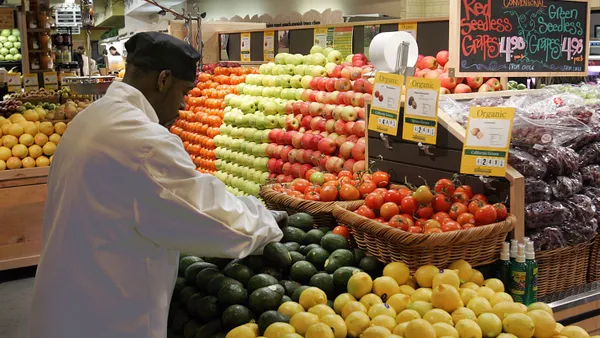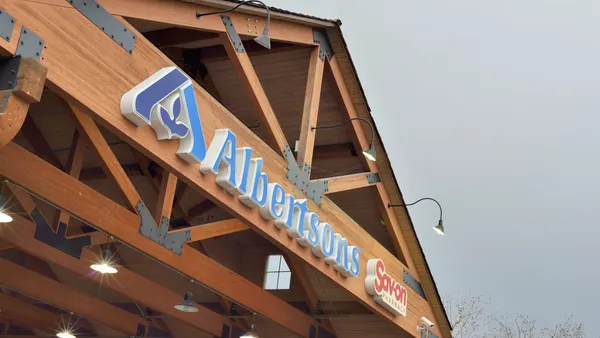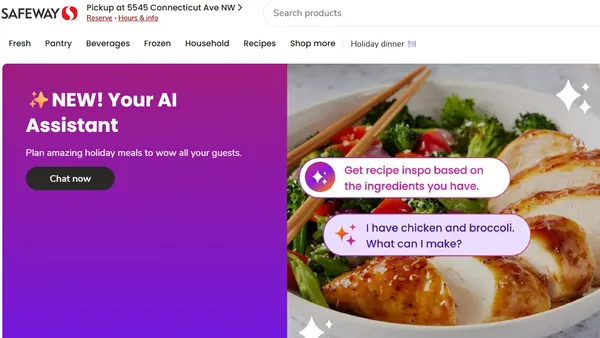Dive Brief:
- H-E-B has partnered with Swisslog, a Swiss warehouse automation company, to build an unspecified number of automated micro-fulfillment centers according to a press release.
- The facilities will serve H-E-B’s e-commerce services, including its curbside pickup and delivery operations.
- The micro-fulfillment centers will be based on Swisslog’s AutoStore technology and SynQ software, which uses robots and bins to rapidly fulfill orders that involve small parts.
Dive Insight:
After struggling to meet a deluge of demand at the start of the pandemic, grocers have scrambled to upgrade their systems to handle e-commerce growth that is unfolding many months ahead of schedule. Automation technology has emerged as a central component of that effort.
Micro-fulfillment technology offers grocers the ability to pick orders faster and more efficiently than human workers can, and maintain their stores' ability to serve customers close to their homes. The technology H-E-B is utilizing from Swisslog is modular and specifically designed to operate in tight locations, which would enable the Texas grocer to place micro-fulfillment centers in or near its supermarkets.
According to Swisslog, the company’s AutoStore system is designed to stack bins that carry products on top of each other and store multiple products in a single bin. The system also is able to learn which products are in highest demand and place the bins that hold them in the most accessible spots to accelerate picking times.
Swisslog also touts the energy efficiency of its system, noting that six of its robots use about the same amount of electricity as a toaster. The company has already installed facilities based on AutoStore at 170 sites around the world.
Swisslog has jumped on the heightened demand for grocery e-commerce brought on by the coronavirus crisis to spur interest in its technology. "COVID-19 and anticipated behavioral changes have created increased urgency around the need for automation within many grocery operations. E-grocery automation is no longer an option…it's a requirement for survival and continued growth,” Mitch Hayes, vice president of e-commerce and retail, Swisslog Logistics Automation, Americas, said in a statement announcing the company’s arrangement with H-E-B.
H-E-B’s approach to automating grocery e-commerce differs from a competing automation concept developed by Britain’s Ocado that relies on large warehouses equipped with vast arrays of robots. Ocado has an exclusive partnership with Kroger to build a fleet of warehouses equipped with the technology in the United States. The facilities, known as consumer fulfillment centers, the first of which will open in Ohio early next year, will be as large as 300,000 square feet.
Several grocers have made recent investments in micro-fulfillment. This summer, FreshDirect linked up with Fabric to deploy a 10,000-square-foot micro-fulfillment center (MFC) in the Washington, D.C. area. Albertsons is currently testing two MFCs and plans to place more facilities in the near future, CEO Vivek Sankaran recently said. Ahold Delhaize, Meijer, Sedano's and Associated Wholesale Grocers have also incorporated micro-fulfillment technology into their online operations.
H-E-B has employed a range of strategies to build up its e-commerce business, including converting underperforming stores into fulfillment warehouses, establishing a separate delivery program for seniors, and acquiring and scaling its own on-demand delivery service. The company has also invested in acquiring tech talent, with a new digital hub completed last year in Austin and another set to open soon in its home city of San Antonio.









